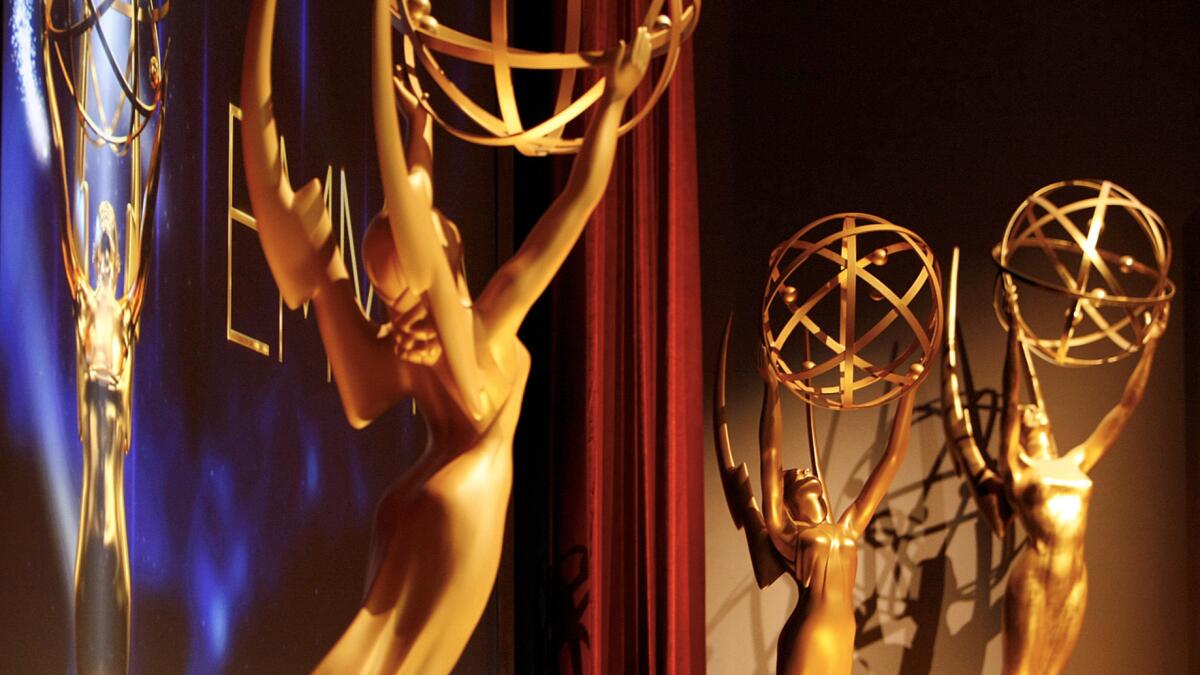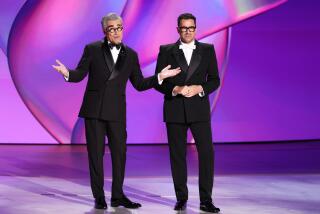How Emmys overtook ratings as the standard for success in the age of Peak TV

The “for your consideration” ads began months ago, on billboards, buildings and buses; in newspapers and magazines; across the top of Hollywood-related websites and in digital pop-ups during any search containing the words “orange,” “thrones” or “catastrophe.” Lavish academy screenings have been held virtually every night of the week, while writers, actors and directors dutifully appear on every media platform available: print profiles, late-night TV, live and digital Q&As, a growing congress of round-tables. There were parties, there was swag, and PR budgets bulged in increments of six digits.
Honestly, if it weren’t for the occasional furnace-blast of a heatwave, you would swear that it was January and that Harvey Weinstein had somehow managed to have 27 films in contention.
But this isn’t the Oscars, this is the Emmys, the nominations for which will be announced Thursday morning. Once the country cousin, she is now the belle of the ball: Never before has the winged woman with her atom been so ardently courted or symbolically on target.
Over the last decade, television has both taken flight and blown itself up. In the new landscape, where the armies of cable networks, streaming platforms and video-on-demand services have trampled all the old mileposts, an Emmy is the last traditional, tangible mark of success.
Ratings may go into free fall, even if their tabulation now includes second- and third-day viewers; a subscription base may stall or shift; networks and streaming services may become both business partners and competitors; but an Emmy is an Emmy is an Emmy.
And everybody wants one.
Ironically, the same forces that empower the award diminish its essential meaning. Awards are inevitably disparaged as arbitrary or political, but there was a time when television came in very few forms and the finest of each was fairly obvious. Now there is so much great and wildly diverse television that, philosophically anyway, the word “best” has almost no meaning.
Television, however, is not a philosophical industry, and no matter how one feels about the relative meaning of awards, the Emmy is now the most important shiny statue around.
It’s always been an honor to win an Emmy, but for years, the award was the definition of face value: It was a lovely acknowledgement of good work by one’s peers. An Emmy could jump-start a new or faltering career or bring cachet to a new or highly popular show, but there was, historically, a whipped cream and cherry connotation. Success in television was not calculated by academy voters; no show, much less a network, lived or died by an Emmy.
But now they do.
Now, any new platform that emerges without a real Emmy hopeful in its first or second season had better rethink its programming strategy. Now, any network without a series, or at least a few stars, in the race had darn well pretend it does, or risk losing its talent.
Success in television used to be as simple as second-grade math. If your show was good, people watched it, critics praised it and the ratings were high; if it was very good, the praise might be a bit more effusive, the ratings a little less high. If the ratings fell, your show was cancelled. The metric was obvious and universal.
Slowly, and then very quickly, cable networks and streaming services made this model obsolete, and they did it in large part by using the Emmys.
As with so many changes in television, it began at HBO. At the turn of the century, HBO made the Emmys both a substitute for enormous ratings – prestige had its own payoff – and a footbridge for those looking to cross from film to television: No shame if there was statuary involved. To boost its chances and subscription rate, HBO began seriously funded Emmy campaigns.
Ratings continued to be more important to basic cable than premium, but networks like FX and then AMC increasingly followed the HBO model. Shows like “Nip/Tuck” and “Rescue Me,” and then “Mad Men” and “Breaking Bad,” aimed for quality rather than quantity, which meant smaller audiences, more nominations and critics’ lists.
Critical attention helped create audience awareness, and increasingly, the new technology took it from there. Viewers could catch up with the conversation by binging and then participate via social media. The new platforms benefited more widely watched shows as well; series like “The Big Bang Theory,” “Grey’s Anatomy” and later “Scandal” soon gave rise to the episode-parsing, line-quoting Super Fan.
But everyone likes superlatives, and if the increasingly crowded yet differently shaped series defied measurement by the traditional MBA models, they all shared a single awards ceremony.
Now well into her 60s, Emmy has become the new gold standard.
While “Mad Men” and “Breaking Bad” racked up awards, surprising contenders like “Hatfields & McCoys” proved that even a super-niche network like History could enter the big leagues. An Emmy nomination quickly became the goal of any new or rebranded platform, a FastPass to industry credibility.
After a soft open with “Lillyhammer,” Netflix officially entered the game with “House of Cards,” and any definition of “awards bait” certainly includes the addendum “See: Kevin Spacey.” Amazon also tested the waters with Garry Trudeau’s “Alphas” before finding its star in “Transparent”; this year, Hulu is pushing its fine comedy “Casual.”
Amid the cacophony of Peak TV, the Emmy race also offers a newly significant shot at PR even for longstanding shows, even if hopes of an actual nomination are slim. Just being part of the Emmy conversation is now as, if not more, important than being “one of the most anticipated shows of the fall”; the inevitable heated conversation about “snubs,” or the broadcast workhorses who never get a break, can do just as much to raise a show’s profile as an actual nomination.
But as increased competition has made the award more meaningful in one way, it can’t help but diminish it in another.
Awards are, by their definition, subjective, especially in television, with its wide array of serial and relationship-dependent forms. And naked campaigning almost always muddies the intrinsic value of any competition.
But television and its academy face many more concrete complications.
As platforms increase, the long-troubling issue of pitting 23-episode censor-bound broadcast shows against the unrestricted artisanal fare of cable has gone from “apples and oranges” to “apples and oranges and lobster and quinoa.”
Two-hour episodes of ongoing series are now entered as “films,” while performers in actual films compete in the same category as those of “limited series,” which include ongoing “anthology series.”
The line between comedy and drama grew so arbitrary that last year, the academy defined it by the clock — a comedy is 30 minutes (or so), a drama an hour (or so), which is how “Orange Is the New Black” came to morph from comedy to drama.
Meanwhile, the sheer volume of television has made the task of judging it near-Herculean. Emmys have always been judged by episodes rather than a season (which in this age of binge-tailored programming is a problem in itself), but viewing even a single episode of every Emmy hopeful now requires more time than most working members of the academy could reasonably be expected to have.
As for consensus, even “best of” lists compiled by critics, people paid to watch and think about as much television as humanly possible, have become wildly divergent.
Hence, the billboards and bus ads, the screening series and round-tables. As with the Oscars, television is increasingly curating its awards season, which, as with the Oscars, makes the process seem more calculated, less organic.
Still, it’s difficult to visualize an alternative. The explosion of good television has been a boon to many — those who make it, those who watch it and certainly those who write about it.
Those who judge it, however, are in a less enviable position. Their decisions have never been more scrutinized, important or increasingly difficult to make.
On Twitter: @marymacTV
ALSO
How ‘House of Cards’ became an Emmy powerhouse for Netflix
John Turturro shines in ‘The Night Of’ role that James Gandolfini had begun filming before his death
It’s time for Hollywood to stop defining great drama as white men battling adversity
More to Read
The complete guide to home viewing
Get Screen Gab for everything about the TV shows and streaming movies everyone’s talking about.
You may occasionally receive promotional content from the Los Angeles Times.







